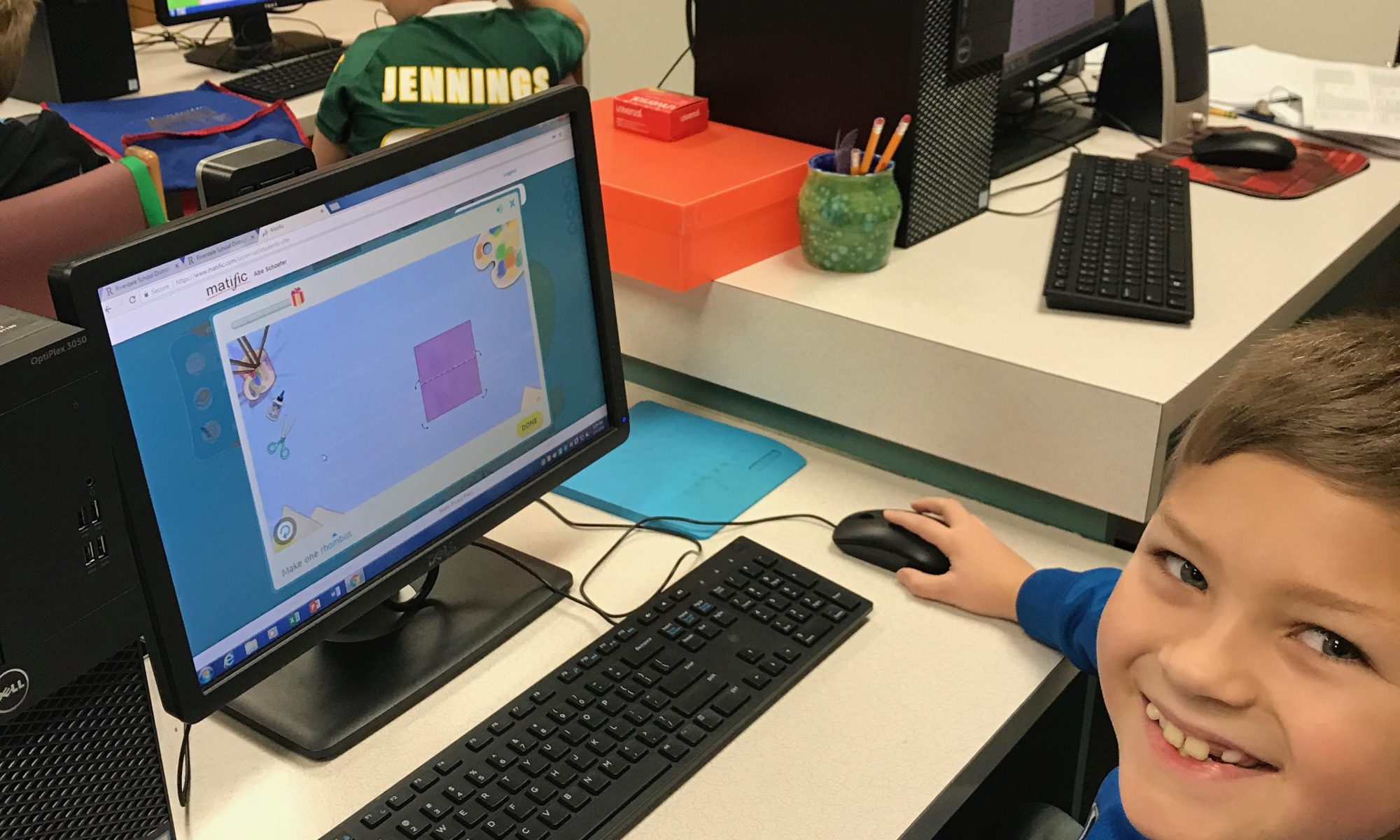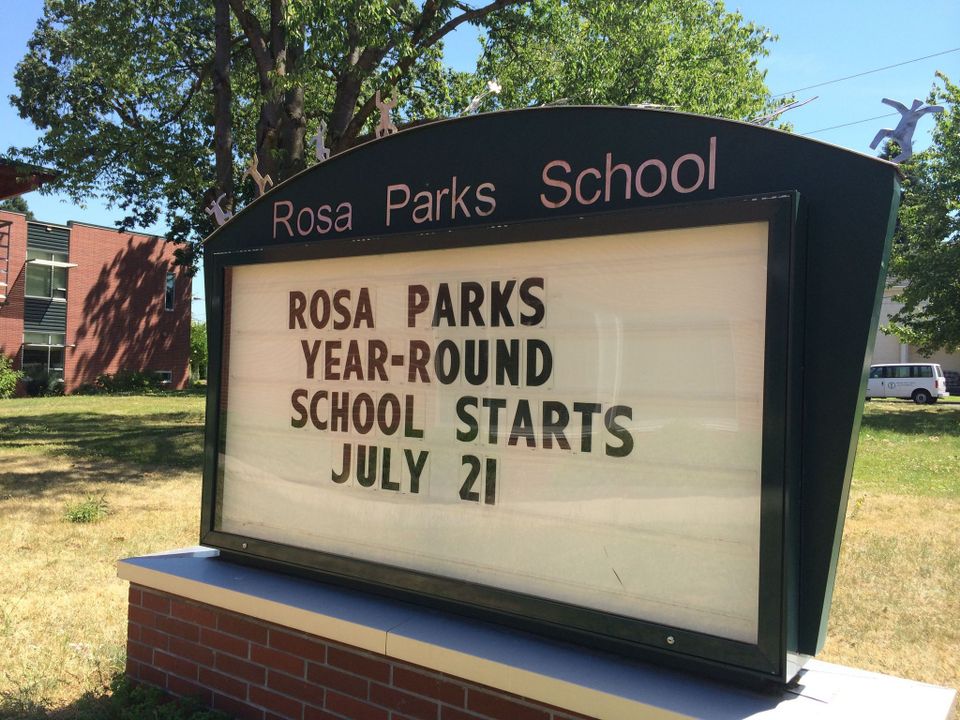Do you feel year-round schools would be a good choice for your district? The article that follows offers information on how to transition to a year-round school format, if you choose to go that route.
First, you need to decide what type of year-round school scheduling system you will use. Year-round schools are usually set up as single-track (ST) with unified attendance or multi-track (MT) with staggered attendance programs. Some schools use a combination of the two. The main difference between the two systems is that single-track allows the entire student and staff population to adhere to the same calendar, and multi-track separates students and teachers and places each in one of several staggered instructional blocks and vacation schedules.
To make this even more complicated, the single-track and multi-track systems can have different variations. In the 60-20 schedule, the school year is separated into three sixty-day sessions with three twenty-day vacations. A variation on this schedule is the 60-15, which provides for an additional three- to four-week collective vacation. This plan can be used with either the single-track or multi-track system. Collectively, these calendars are used by a little more than a third of year-round schools in America.
Lastly, let’s talk about two year-round calendars that are used by around 40 percent of year-round schools. In the 45-15 schedule, forty-five days of instruction are followed by fifteen days of vacation time. The related 45-10 schedule provides an additional four-week vacation for staff and students. Again, these plans can be implemented in either a single-track or multi-track system (Quinlan et al. 1987).
Choosing an implementation team
Before attempting to set up a year-round school in your district, it is important to get approval from at least 80 percent of your faculty, staff, and parents. This will require a number of meetings, presentation of literature on the subject, and time for discussion. If you do not get approval, you should strongly reconsider implementing a year-round system in your district. Assuming that you will receive the necessary approval, let’s move on to the next steps.
When transitioning to a year-round school setup, you must first assemble the implementation team. Groups no larger than seven usually work best. The team can be made up of a variety of district personnel and staff. Implementation teams normally consist of a school board member, the superintendent and assistant superintendents, principals, teachers, and other pertinent individuals.
Once the team is created, efforts must be made to assess the district’s capacity for implementing and sustaining year-round schools. The team must ask itself whether the district has all of the resources needed to implement and sustain a year-round system. In extreme cases, when the district feels it is unable to coordinate its own implementation efforts, the team may want to consider hiring an experienced educational consulting firm to oversee the process. There are many well-qualified firms that will be able to either work in conjunction with an implementation team or oversee the process themselves. Note, however, that this can turn into an enormous job with a significant price tag.
The consulting team or team leader must be committed to developing and implementing innovative strategies that have the potential to effectively produce educational change. Simply assembling a top-notch team is not enough, however. All of the major administrators, including the superintendent and school board, must fully support the decisions of the implementation team.
Remember that parents, community leaders, and policymakers must also be included in the process. Many parents are involved in their students’ educational plans and want to be informed of any changes. The implementation team will need to decide if parents and community leaders should be included as formal members of the team, or to simply elicit their advice and expertise as needed. When making decisions concerning which individuals will populate the team, remember to include members that have the expertise to be taken seriously within the district.
Involving parents and community members in the implementation process might provide the restructuring team with a way to engage other members of the community, such as grassroots organizations, local business leaders, and area politicians. Community members can also assist the school in choosing the correct year-round school system and schedule. It is vital for the team to understand the culture of the community, its needs and wants, and the life skills its young people require.
If the school would like to create fundraisers to assist in the efforts to transition to a year-round school system, it is important that the community members understand why the school wants extra money and why they should give the extra money. If the community members disagree with the changes being made, they will be less likely to participate or contribute to the cause.
Having an implementation team is an important component in a successfully transition to a year-round school system. The task of choosing the leader and deciding on the roles of the implementation team should not be taken lightly. In many instances, the leader of the implementation team will be the superintendent or someone he or she appoints. Alternatively, the leader and other members of the team can be voted in. The leader must be held accountable for ensuring the success of the entire team as it moves to implement and sustain year-round schooling. The leader’s roles might include, but are not restricted to, determining the areas of expertise the team members bring to the table and how he or she can utilize that expertise.
Implementing a year-round schooling system
To ensure the minimum amount of time is spent on implementing the system, the leader will need to establish a standing meeting time and develop an agenda to utilize time to the fullest extent possible. The leader must decide if the team should have mandatory or optional meetings. If the meetings are optional, the leader must decide how information is disseminated to members who do not attend meetings. Prepared agendas are essential for smooth meetings and excellent communication within the team.
Once the year-round system is approved by all team members, the plan will need to be approved by the superintendent before it is presented to the school board. The same rules apply whether implementation is needed by one school or by all the schools in the district.
A concern, alluded to in the comments above, is the need to assess the district’s capacity for implementing and sustaining a year-round schooling system. To appropriately assess the abilities of the district or school, the leader will need to complete an inventory of the pros and cons. If the inventory concludes that the district or school does not have the capacity to implement or sustain the plan, it may be wise to suspend the idea until you have the necessary capacity.
Often, volunteer team members do not understand the dedication and length of time it will take to carry out the transition to a year-round schooling schedule. Before the team starts to implement the necessary changes, the leader will need to stress to all team members the enormity of the task, the number of hours the members will need to dedicate to the project, and what is at stake.
Once the team’s year-round schooling plan has been approved, it is time to implement the approved plan. First, the implementation team will discuss possible impediments to the approved plan and ensure the team has a contingency plan in place to deal with the issues as they arise. Next, they should implement their target goals and timelines. The leader will need to appoint a member of the implementation team to take on the responsibility of collecting, reporting, and evaluating any data collected. The leader will use the data collected to continuously revise and refine the team’s implementation efforts, as well as report their findings to the superintendent and/or the school board.
A useful tool for education specialists considering a move to year-round school years is the “Year-Round Education Program Guide” published by the California Department of Education. The guide takes you through the process of deciding on and implementing a year-round schooling calendar. The steps below are taken from the guide.
Implementation steps
- Select schools and grade levels.
- Establish a process for resolving issues.
- Select and approve a calendar by working with employee groups.
- Assess the need for facilities modifications, including shade modification and storage areas for off-track teachers.
- Submit budget requests to district business office.
- Decide if year-round education will be implemented on a voluntary or mandatory basis for students and employees.
- Develop and approve a track preference and assignment policy for students, keeping in mind the need for same schedules for family members. Balance tracks by ethnicity, academic ability, socioeconomic level, and educational need.
- Develop and approve a track assignment policy for teachers and staff.
- Determine staff in-service schedule.
- Institute a year-round education informational network for certificated and classified staff members and parents.
- Send choices of tracks to parents by early spring.
- Notify parents as soon as possible of track assignment.
- Develop a policy and system for track-change appeals.
- Develop a system for delivering services during the summer (e.g., classroom supplies and textbooks).
- Modify/expand food services according to need.
- Modify payroll periods.
- Develop a system for plant maintenance and utilization of empty rooms.
- Ensure that air conditioning and insulation are able to provide summer comfort.
- Bargain with all appropriate classified and certificated units.
- Develop a work schedule for office, custodial, and administrative staff members.
- Develop a system to deliver electives and special services, such as special day classes, psychological services, resource specialists, and bilingual education.
- Ensure appropriate cash reserves to meet summer payroll and supply expenses.
- Modify transportation system as required, including routes, number of buses, and service schedules.
- Establish a system for teacher room rotation or roving.
- Develop a community-school communication system for notifying off-track families of important school dates and activities.
- Provide activities for connecting off-track employees and parents.
- Reschedule special events such as holiday programs.
- Design attendance accounting system as required.
- Modify report card schedule.
- Coordinate with community services, such as the recreation department, youth organizations, church groups, and the police department.
- Identify and coordinate with child care providers.
- Identify intersession instructional programs and schedules.
- Modify student testing program (California Department of Education 2015).
Track assignment considerations
General axioms
Establish the following priorities in deciding who gets first track preference, of a track:
- Respect district employees and keep parents on the same track as their children.
- Respect the terms of divorce settlements by respecting parents visitation schedules.
- Consider unique family circumstances (e.g., predictable annual visits of families located in different parts of the country or the world).
- Acknowledge unique educational opportunities (e.g., a cello prodigy who is offered a summer camp).
- Use a fair, balanced track assignment policy once priorities have been honored. Each track should mirror the ethnic and socioeconomic composition of the entire school population.
- Minimize ability and/or special education need track segregation. If a special population must be put on one track, isolation and segregation can be minimized by partial day integration of self-selection of track.
- Develop an appeals process, including:
- A site administrator.
- An appeal committee (made up of an administrator, a teacher, and a board member).
Do not:
- Load tracks by ability level.
- Load tracks by special groups (e.g., band or football).
- Move students from track to track each year (unless requested).
- Wait too long to announce track assignments.
Operational strategies for special services
Special day classes
- Typically confined to one track (or two if the population warrants).
- Extended school year days are typically offered during intersessions (California Department of Education 2015)
Evaluation of a year-round schooling system
In order to validate their efforts, the implementation team will need to evaluate the effectiveness of its year-round schooling system. The process of evaluation can be completed in-house, or the district can hire outside consultants to perform the task. Hiring outside consultants is preferable, as it provides an impartial evaluation of the year-round schools. However, this can be costly, so many school districts may have no choice but to do it themselves. If the implementation team is willing to evaluate the success of the year-round school system, they must first develop a plan for evaluation.
The team’s evaluation plan should have been developed before the year-round schooling system was implemented. Performance goals that were created at the beginning of the implementation process should be used to guide the evaluation process. The team will need to decide who will collect, analyze, and interpret the data. In order to avoid biased results, it may be in the best interests of the school to hire an outside consultant who may provide a more objective assessment. The team will also use the results to determine whether the year-round schooling system was effective. The results may indicate that the plan was not a success. In this case, the best solution is to build upon the small successes and learn from the mistakes.
Implementation of a year-round school system is a long-term process. Reform occurs on a continuous cycle that must be sustained in order for improvements to be maintained and furthered. Keep in mind that not every reform effort bears fruit. Even the best schools have to continue to work in order to perfect their year-round schooling system.
References
Adler, Rachel, Rebecca Franckle and Kirsten Davison. 2014. “Accelerated Weight Gain among Children During Summer Versus School Year and Related Racial/Ethnic Disparities: A Systematic Review.” Preventing Chronic Disease 11:130355. Accessed September 9, 2016. http://dx.doi.org/10.5888/pcd11.130355.
“Benefits of Year-Round Schools Touted.” n.d. Education News. Accessed September 9, 2016. http://www.educationnews.org/articles/benefits-of-year-round-schools-touted.html.
Breslow, Jason. 2012. “By the Numbers: Dropping Out of High School.” PBS Frontline. Accessed September 9, 2016. http://www.pbs.org/wgbh/frontline/article/by-the-numbers-dropping-out-of-high-school/.
Burgess, Matt. 2013. “Mapped: How Many Hours Do Children Spend at School around the World?” Help Me Investigate. Accessed September 9, 2016. http://helpmeinvestigate.com/education/2013/04/mapped-how-many-hours-do-children-spend-at-school-around-the-world/
California Department of Education. 2015. “Year-Round Education Program Guide.” Accessed September 9, 2016. http://www.cde.ca.gov/ls/fa/yr/guide.asp
Chaika, Gloria. 1999. “Is Year-Round Schooling the Answer?” Education World. Accessed September 9, 2016. http://www.educationworld.com/a_admin/admin/admin137.shtml.
Dessoff, Alan. 2011. “Is Year-Round Schooling on Track? Summer Learning Loss and Overcrowding Drive Alternative Schedules.” District Administration. Accessed September 9, 2016. https://www.districtadministration.com/article/year-round-schooling-track
“Education Policy: Advantages.” n.d. K12 Academics. Accessed September 9, 2016. http://www.k12academics.com/education-policy/year-round-school/advantages#.V9VFZ_krLDd.
Fitzgerald, John. 2009. “Minnesota School Year Requirements Too Casual.” Minnesota 2020. Accessed September 9, 2016. http://www.mn2020.org/issues-that-matter/education/minnesota-school-year-requirements-too-casual
Holzman, Seymour. n.d. “Year-Round School: Districts Develop Successful Programs. Education USA. Accessed September 9, 2016. http://eric.ed.gov/?id=ED062682.
Lederman, Doug. 2009. “The Impact of Student Employment.” Inside Higher Ed. Accessed September 9, 2016. https://www.insidehighered.com/news/2009/06/08/work.
Mendez, Edgar. 2014. “Congressional Report Highlights Year-Round Schools.” Milwaukee Journal-Sentinel, July 8, 2014. Accessed September 9, 2016. http://archive.jsonline.com/blogs/news/266264841.html
Morin, Amanda. 2016. “The Pros and Cons of Year-Round Schooling.” Child Parenting. Accessed September 9, 2016. http://childparenting.about.com/od/schoollearning/a/year-round-school-pros-cons.htm.
O’Brien, Daniel M. 1999. “Family and School Effects on the Cognitive Growth of Minority and Disadvantaged Elementary Students.” University of Texas at Dallas. Accessed September 9, 2016. http://www.utdallas.edu/research/tsp-erc/pdf/wp_obrien_1999_family_school_affects.pdf .
“President Obama Wants to Keep Kids in School Longer: Extended Days, Weekend Hours, Shorter Summers.” NY Daily News, September 28, 2009. Accessed September 9, 2016. http://www.nydailynews.com/news/national/president-obama-kids-school-longer-extended-days-weekend-hours-shorter-summers-article-1.407418
Quinlan, Claire, George, Cathy and Emmett, Terry. 1987. Year-Round Education: Year-Round Opportunities. A Study of Year–Round Education in California. Los Angeles, CA: California State Department of Education.
Rogers, Kate. 2014. “How to Keep Your Electricity Bills Cool This Summer.” Fox Business. Accessed September 9, 2016. http://www.foxbusiness.com/features/2014/05/27/how-to-keep-your-electricity-bills-cool-this-summer.html
Von Hipple, Paul. 2007. “Save Iowa Summers.” Accessed September 9, 2016. http://www.saveiowasummers.com/wp-content/uploads/2010/07/Paul-von-Hipple-Research1.pdf.
Washington, Jessica. 2013. “Year-Round School Could Be the Answer to the Minority Drop-Out Problem.” Politic365. Accessed September 9, 2016. http://politic365.com/2013/05/20/year-round-school-could-be-the-answer-to-the-minority-drop-out-problem/
American Academy of Child and Adolescent Psychiatry. “WatchingTV/Screen Time and Children.” n.d. Accessed September 9, 2016. http://www.aacap.org/AACAP/Families_and_Youth/Facts_for_Families/FFF-Guide/Children-And-Watching-TV-054.aspx.









